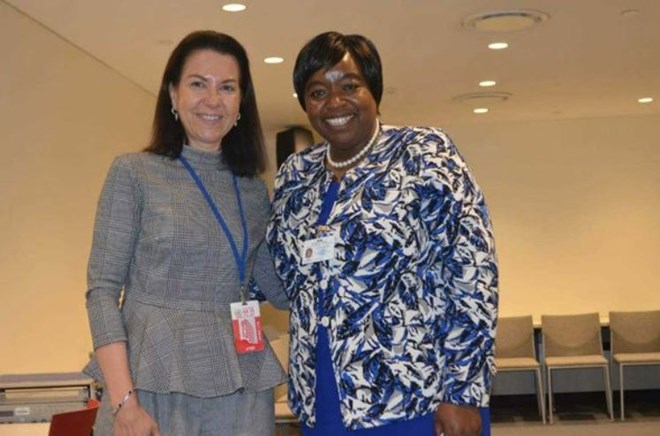
Wednesday September 26, 2018

Kenya Foreign Affairs Cabinet Secretary Monica Juma is calling on the international community to place integration of terror merchants who quit the vice, at the heart of sharing information on violent extremism.
On the sidelines of the 73rd UN General Assembly in New York, Dr Juma said countries like Kenya who continually face the threat of terrorism must improve sharing information on the evolution of terror groups, even as they keep an open door for those who want to convert back to normal society life.
"We need to enhance cooperation in sharing information and movement of returnees even as they are integrated back to the society," she said.
"This, including the degree of documentation about these people, is useful as we try to rehabilitate them to the society."
Dr Juma spoke at a sidelines meeting with the UnderSecretary General and Head of the United Nations Office for Counter-Terrorism (UNOCT), Mr Vladimir Voronkov, and the Assistant Secretary General and Executive Director of the Counter-Terrorism Committee Executive Directorate (CTED), where they discussed strategies to combat changing violent extremism.
Kenya, whose troops are fighting in Somalia as part of the African Union Mission in Somalia (Amisom), has also faced threats back at home from militant group Al-Shabaab and their allies. Last week, Kenya marked five years since the Westgate Mall attack in Nairobi on September 21 in 2013 in which 63 people were massacred in the four-day siege laid by a four-member terror gang affiliated to the Shabaabs.
On April 2, 2015, Al-Shabaab laid another siege on the Garissa University College, killing 147 people. In the wake of these deadly incidents, Kenya had responded by rounding up suspected illegal Somali immigrants in Nairobi, cracking down on controversial Muslim clerics suspected to be recruiting Kenyans into terror gangs and decided to build a wall in Somalia.
But President Uhuru Kenyatta would change tack again, after human rights activists accused the new tactic of violating civil liberties. His government appointed new officials charged with monitoring security and even drafted a new strategy that involves communities.
In New York, Dr Juma said these new system has started paying off given the reducing number of attacks, but called for relentless cooperation in "in up-scaling action in the fight against counter terrorism and counter violence extremism, rehabilitation and reintegration of the fighters back into the society."
She called for cooperation specially with the UN which she argued should be "structured around increasing support."
Since last year in June, the UN General Assembly had mandated UNOCT "to enhance coordination and coherence, and to strengthen the delivery of the United Nations counter-terrorism capacity building assistance to Member States."
Mr Voronkov acknowledged Kenya’s leadership role, from its own experience, in the area of Counter- terrorism and Counter- Violence Extremism strategy.
He suggested said the UN would be working on a proposal to establish a network of national coordinators on counter terrorism which he argued could boost sharing of experiences and best practices.
The executive director Ms Michele Coninsx, noted that Kenya has made significant progress in improvement of border management and especially in addressing the issue of porous borders with neighbours. Recently, the President created a border patrol unit of the police as well as the coast guard, important sections which once formed could improving policing of the entry points.
Present at the meeting were Dr Martin Kimani, Director- National Counter-Terrorism Center and Ms Koki Muli, Kenya's Deputy Permanent Representative to the UN in New York.
Kenya and Ethiopia are on October 1 expected to exhibit, at the UN, how they are jointly improving their border management between them as well as reducing border clashes between people.